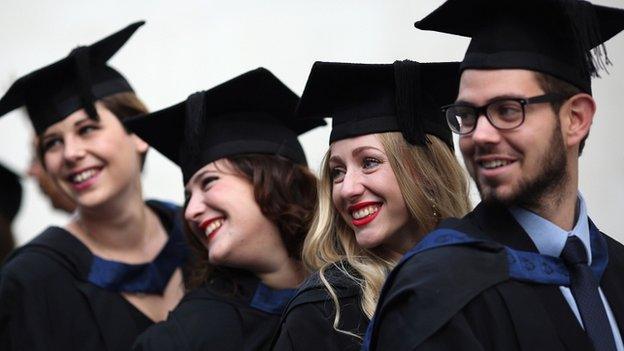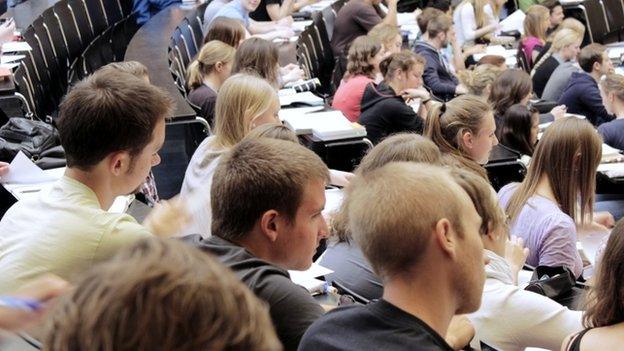Will students get 'value for money'?
- Published

Record numbers of students: Graduation at London South Bank University last month
A cynical colleague once said there were only two stories from universities:
1) Universities say it will be a disaster if they don't get more public money
2) Universities say it will be a disaster if anyone tells them how to spend their money.
Of course that's an unfair caricature of what must be one of the most successful social revolutions of the past half century.
The demand for universities has risen relentlessly and the size of the sector has grown out of all recognition. There are more people now getting degrees than were getting five O-levels in the early 1980s.
But has higher education kept up with these changes?
A Green Paper put out by Universities Minister Jo Johnson focuses on getting better value for money for students.
The increase in fees to £9,000 per year has irrevocably changed the relationship between student and university. It's now a transactional, contractual arrangement, as well as an academic and social experience.
When students only get six or seven hours a week contact time with academic staff, they look at how much they are paying for those hours.
That might have been fine when university was free, but it's a different when it's going to take decades to pay off.
Office for Students or 'Ofstud'
There is going to be a new student-friendly regulator, bringing together some existing bodies, which will be called the Office for Students.

Mr Johnson wants to drive up teaching standards across the higher education sector
Apart from the likelihood this is likely to be re-named Ofstud, it suggests that students have never really got the consumer power that they were promised.
When fees were hiked to £9,000 it was part of a package that was meant to deliver more choice and a proper market in higher education.
There was an expectation that different universities would have different fee levels and there would be lots of new universities opening with lots of options for students.
Except in practice, almost all the universities charged £9,000 and there were relatively few new providers. For students, the market never really happened and they were left paying three times as much as before.
The latest proposals will be an explicit attempt to make it easier for new universities to open and for more institutions to be given degree-awarding powers.
The aim, as before, is to create a more diverse range of options.
But this has been a landscape that has been curiously resistant to change. Vice chancellors can play a much longer game than ministers.
And it might take new players to make any substantial impact.
Value for money
Because although dependent on public funds, universities are private institutions, and have a long track record of choosing which government proposals to adopt and which to imperceptibly roll into the sidings with the promise of further reviews that slip over the horizon.
But the slow-release of the impact of fees is not going to go away.
When the Green Paper talks about "value for money" how precisely could that be applied?
If a history student is paying £9,000, do they want the full amount spent on their own less-costly course, than allowing it to be used as a cross-subsidy for a scientist, using more expensive equipment and getting longer teaching hours?
What is "value for money" in this context? Should they be paying different amounts for degrees of equal status?
Such questions would never have arisen when the contract with a university was academic rather than financial.
But as the Green Paper makes clear, it's no longer acceptable for universities to take the money, without being as rigorous about the quality or quantity of teaching.
It's as if the universities are being nudged to say that they can't turn their back on what are now their paying customers.
- Published6 November 2015
